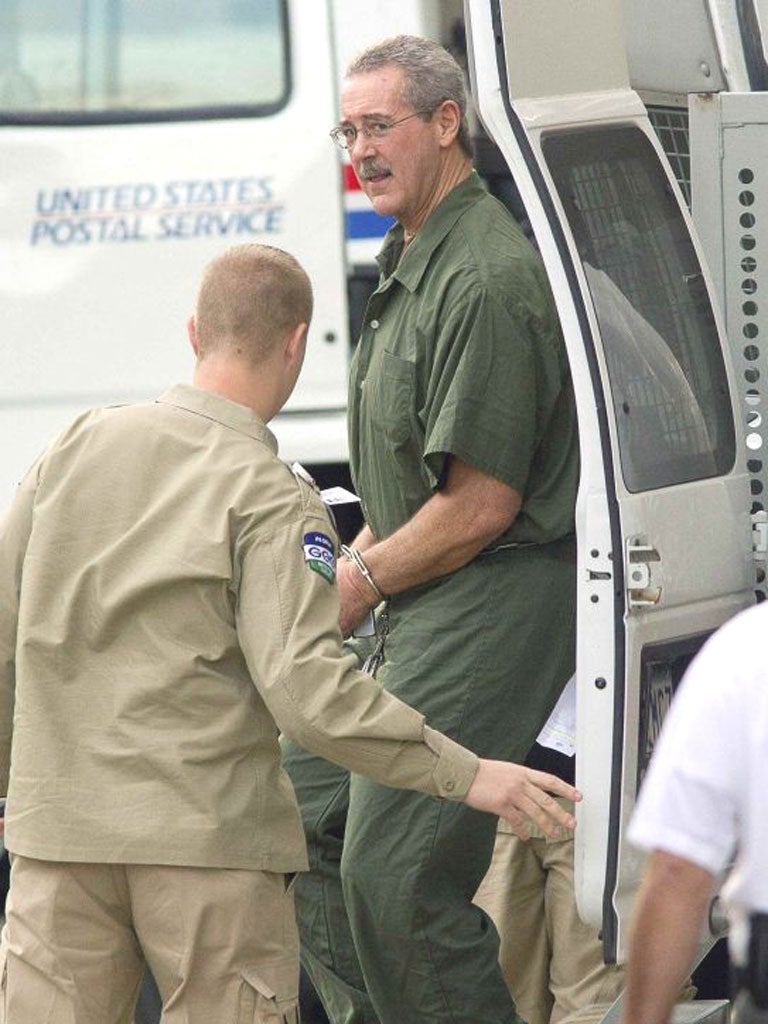Your support helps us to tell the story
From reproductive rights to climate change to Big Tech, The Independent is on the ground when the story is developing. Whether it's investigating the financials of Elon Musk's pro-Trump PAC or producing our latest documentary, 'The A Word', which shines a light on the American women fighting for reproductive rights, we know how important it is to parse out the facts from the messaging.
At such a critical moment in US history, we need reporters on the ground. Your donation allows us to keep sending journalists to speak to both sides of the story.
The Independent is trusted by Americans across the entire political spectrum. And unlike many other quality news outlets, we choose not to lock Americans out of our reporting and analysis with paywalls. We believe quality journalism should be available to everyone, paid for by those who can afford it.
Your support makes all the difference.Allen Stanford, the globe-trotting Texan playboy who once claimed that his billion-dollar fortune would transform English cricket, has been found guilty of organising one of the world's largest Ponzi schemes.
A jury in Houston last night convicted the 61-year-old financier of defrauding investors of almost $7bn. He was found guilty on 13 of the 14 charges against him, including conspiracy, fraud, and obstruction of justice, and now faces up to 20 years in prison.
The verdict followed a blockbuster trial in which Stanford was accused of illegally siphoning off investors' cash from his banks and other finance businesses to fund a lavish lifestyle over a period of 20 years. His collapsed pyramid scheme was second in size only to that of Bernie Madoff's.
Stanford, dressed in a prison jumpsuit, stared at the floor as the verdict was announced. In the gallery, his mother and children hugged each other, while one of his daughters began crying.
It was a far cry from the bombastic scene at Lord's in 2008, when Stanford emerged from a helicopter carrying $20m in new banknotes, which he claimed was to be prize money for a new professional 20/20 tournament. Traditionalists at the Home of Cricket bemoaned the debasement of their sport, and a year later they gasped when, in Antigua, Stanford was photographed nonchalantly bouncing the wives and girlfriends of the England team on his knee.
The court heard that the money in Stanford's briefcase that day was the proceeds of a spectacular fraud. Over two decades, he lured clients to hand over large sums of money in exchange for "certificates of deposit" in a bank on the Caribbean island of Antigua.
Investors were told that their cash was being safely placed in stocks, bonds, and other securities, where it was earning too-good-to-be-true interest rates. Instead, it was being spirited away through Swiss bank accounts to fund Stanford's colourful lifestyle.
According to prosecutors, Stanford used the company as "his own personal ATM," and fathered six children with several different, younger women. At the height of his powers, he owned several yachts and private jets and was listed by Forbes as the world's 605th richest man.
Large bribes were paid to foreign officials to keep regulators at bay, and still more investor cash was blown on disastrous, but often extravagant business ventures. He promised, for example, to spend $100m on creating a global 20/20 cricket franchise, but despite the fawning support of the England and Wales cricket board, the scheme never took off. When Stanford's edifice crumbled, following his arrest by the FBI in 2009, the 30,000 investors, who thought they had a share in $8bn of assets, discovered that around 92 per cent of their money was missing. Most have as yet been paid back only pennies per dollar they had invested.
During his six-week trial, Stanford's attorneys sought to blame financial irregularities on his right-hand-man and former university room-mate, Jim Davis, who he claimed handled all of the company's finances. But prosecutors struck a plea-bargain which saw Davis testify against him.
Stanford then declined to give evidence in his own defence, claiming that a beating he endured in prison had left him dependent on painkillers and unable to remember large portions of his career in business. The jury clearly didn't buy that claim, acquitting him only of one count of wire fraud. His chances of ever leaving prison now rest with the judge, David Hittner, who must decide whether he will serve his sentences together or consecutively.
Stanford's attorneys continue to insist that his bank would have remained solvent had the US government not arrested him in 2009. They say they expect to appeal.
Timeline: How the billionaire lost it all
1986 Allen Stanford founds Stanford International Bank.
12 June 2008 Stanford rises to fame in the UK after agreeing to finance five England cricket matches with a prize fund of $20 million, but has to apologise in October after being filmed at a game with his arms around England players' wives and girlfriends.
17 February 2009 Federal agents raid Stanford's banking offices, later accusing him of operating a "massive Ponzi scheme."
26 September 2009 Stanford enters hospital after being beaten by inmates in prison, leading to his lawyers claiming he is not fit for trial due to amnesia caused by injuries.
24 January 2012 Trial begins.
6 March 2012: Found guilty.

Join our commenting forum
Join thought-provoking conversations, follow other Independent readers and see their replies
Comments